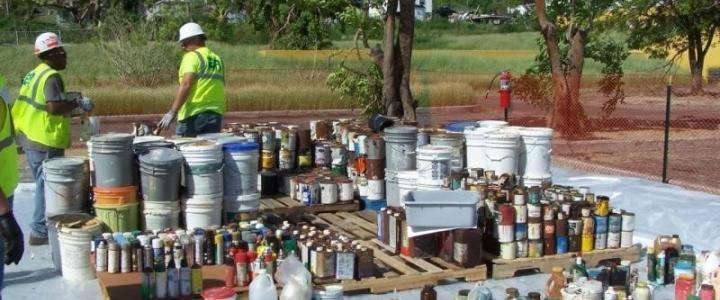
February 2023: What's Lurking Under Your Kitchen/Bathroom Sink?
Just as we should only flush the three P’s (pee, poop and (toilet) paper), we also need to be careful about what we throw in our garbage. There are many things we all have in our homes, like household cleaners, paints and other chemical products, that are considered household hazardous waste (HHW) once you have determined you no longer need them. When disposing of these wastes, there are alternative disposal methods (see below) rather than throwing it in with the household trash.
Hazardous waste is a waste with properties that make it dangerous or capable of having a harmful effect on human health or the environment. These products can have a variety of properties that make them hazardous, including:
- Flammable: Easily set on fire or ignited.
- Corrosive/Caustic: Burn and destroy living tissue on contact.
- Explosive/Reactive: Detonate or explode by exposure to heat, sudden shock or pressure.
- Toxic/Poison: Capable of causing injury or death through ingestion, inhalation or absorption through the skin.
When trying to determine which products would be a hazardous waste, look for chemical labels and read the instructions and warnings on the back of common household products. If the label says, “Danger,” “Warning,” “Poison” or “Caution,” the product contains hazardous ingredients.
What’s the harm?
When stored or used improperly, product vapors may react with the chemicals in another product creating toxic gases, poisonings and even fires. Every day, products like drain cleaners, pesticides, bleaches and furniture polish are thrown into the household trash where they are free to come in contact and react with each other.
Even if the chemicals in these products don’t react in the garbage, their disposal as solid waste could allow them to leak into the environment, where they might contaminate the air we breathe and water we drink.
Where do they go?
So, if you can’t throw these products out in the trash, then what should you do with them?
- The absolute best way to ensure that you dispose of these hazardous products properly is to simply use them for their intended purpose until they’re completely gone, and then dispose of the packaging properly.
- However, if this is not a viable option for you, giving the product to a friend, relative, or even donating to an organization that you know will use the product properly is a next best option.
- If you must dispose of these products as waste, first check your town’s website or contact your town offices directly for information on when the next HHW Collection Day will be. Most towns hold collection days in the spring or fall, sometimes both. A list of towns with collection events and their contact information can be found on the NHDES website.
If there are no collection events in your town or you need to dispose of something before the next event rolls around, there are some other options, such as the Lakes Region Household Hazardous Product Facility in Wolfeboro. This facility is open each third Saturday of the month from May through October. Anyone who lives outside of Wolfeboro and Alton can bring their HHW for a fee of $45 per gallon.
Special Instructions
There are several types of waste that cannot be collected as HHW nor disposed of at your local solid waste facility:
- Fluorescent bulbs or mercury-containing devices: Items containing mercury cannot be disposed of in NH, however, they are highly recyclable. Check with your town or transfer station operator to determine how they are managed at your local facility.
- Mercury thermostats: Mercury thermostats can be recycled for free through the Thermostat Recycling Corporation. Contact your solid waste facility for more information or go to www.thermostat-recycle.org.
- Latex paint: Dry the paint out and then dispose of it in the trash.
- Ammunition, fireworks, flares or explosives: Call the State Police at (603) 271-3636.
- Smoke detectors: If it contains radiological material, return to the manufacturer by mail. If not, dispose of it in the trash after removing the battery. See the "Smoke Detectors and Proper Disposal Methods" fact sheet.
- Asbestos: Hire a professional. Asbestos is a solid waste and a hazardous air pollutant. Do NOT dispose of asbestos in your household garbage.
Focus on reduction
There are also some ways to mitigate the hazardous waste that you generate at home by looking at alternatives. One of the most popular and effective options when it comes to household cleaners is switching to plant-based or even homemade products. You can find a variety of cleaning products and detergents like that online. Check out EPA’s Safer Choice website to find products that perform and contain ingredients that are safer for human health and the environment. For ideas on making them at home, check out the NHDES “Alternative Household Products” fact sheet.




